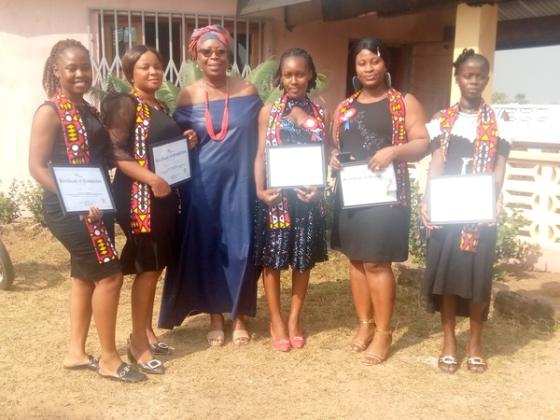Liberia: Several Young Women Benefit From Jola House Foundation

Liberia: Several Young Women Benefit From Jola House Foundation
— as it opens officially to the public
Jola House Foundation, a 100 percent Liberian-owned social enterprise, has distributed several handmade African bags as a way of giving back to the community.
Most of those who received the full package were babies’ mothers and pregnant women who were trained by the entity as a way of encouraging them to be more productive in society.
On February 18, the organization produced and distributed handbags in commemoration of its 10th year of existence and the 5th graduation exercise in Banard’s Farm Community.
Mrs. Elfreda Mayson, Executive Director of Jola House Foundation, said Jola is committed to transforming the lives of vulnerable women through skills development and entrepreneurship opportunities.
Over the last 3 years, the organization has been supporting pregnant women and baby mothers at various health facilities across Montserrado.
Jola House is a one-stop market place showcasing beautiful handmade products by artisans trained by the foundation and other makers in Liberia.
Despite all the challenges and setbacks, which include Ebola and COVID-19, Mayson said, the organization was able to preserve its momentum and reach this far.
It is a non-profit social enterprise entity based in New Jersey, USA and Liberia, as a bicoastal institution launched in 2012. Its mission is to reduce economic inequality for women in Liberia by developing income-generating opportunities through skills training, production, marketing, and exporting handmade products.
Over the past 10 years, the entity has trained hundreds of women in handcrafted materials, and today these beneficiaries were able to testify during the occasion.
“Our model has been very simple: to enhance and develop Liberian women's skills and give them the opportunity to be financially independent,” she added.
“I know it is difficult to bring this vision to life,” she said, “because in this country of ours everyone is trying to survive on a daily basis; even the women that have been able to get the training, it has also been challenging.”
According to her, the school offers training for six months, and some of the students don’t have the energy or the endurance to spend six months of their lives being trained. However, Mrs. Mayson encourages them, saying, “There are some benefits, and that is that you will suffer, but at the end of all, God will help you.”
Bushie Fallah, a graduate and beneficiary of the program, expressed excitement and lauded the management of Jola House Foundation. Jola House has transformed my life in such a special way that today I can safely say I am a fashion designer and an entrepreneur. I came here with the mindset of just sewing my first Sunday clothes and wearing them anytime I had an event at hand. "The institute has changed it around; they made me understand that it is not just about wearing new clothes but about making yourself useful in society,” Miss Fallah noted.
Following the six months of training, many of the ladies today have begun to understand their God-given talents through the organization. These young women use the hands that God has given them to support themselves and their families.
However, the mission of Jola House is to reduce economic inequality for women and youth by generating work opportunities and providing training in the design, production, marketing, and export of “Made in Liberia” products.
Over the years, vocational and business development training has increased the number of women who have their own source of income, thus contributing to their family, community, and society at large. At the end of the training program, women are able to secure employment at Jola House, other shops and factories, or start their own businesses.
Currently, the entity shop communicates its impact with regards to women’s economic liberation. These showcase how a product purchase can translate into supporting women’s equity in Liberia.
